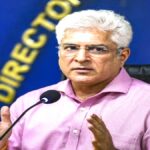When President-elect Donald Trump shocked Washington insiders by selecting Robert F. Kennedy Jr. to head the Department of Health and Human Services (HHS), it sent ripples through K Street—the heart of Washington lobbying. Kennedy’s reputation as a controversial anti-vaccine advocate and outspoken critic of industry regulations has left lobbyists scrambling to understand how they should respond.
Lobbyists had expected Trump to choose a more traditional pick to lead HHS, a position with immense power over U.S. health policy, drug regulation, Medicare and Medicaid, and food safety. Instead, Trump’s choice of Kennedy—whose policy ideas challenge many of the interests lobbying the government—has raised alarm. Kennedy’s potential agenda could disrupt industries ranging from pharmaceuticals to agriculture, forcing many corporations to rethink their strategies.
Industry Leaders Face Uncertainty
The reaction from the health and food industries has been one of cautious concern. Many lobbyists initially believed Trump would tap someone like former Louisiana Governor Bobby Jindal or former Surgeon General Jerome Adams to run HHS. But Trump’s pick of RFK Jr.—a figure whose ideas often go against mainstream scientific consensus—has thrown them off balance.
Kennedy has been a vocal critic of vaccine safety, the use of pesticides in farming, and what he sees as the overreach of government agencies overseeing public health. He’s also proposed sweeping changes to food policy, including a ban on processed foods in schools. For industries tied to these sectors, his selection is seen as a potential threat to their bottom lines. While many lobbyists have advised clients to stay calm, others are already working behind the scenes to find ways to mitigate the impact of Kennedy’s policies.
John Strom, a special counsel at the law firm Foley and Lardner, is advising health industry leaders to hold off on confrontation. “It’s prudent to take a wait-and-see approach,” he says, recognizing the need for caution given the uncertainty about how Kennedy would approach his role at HHS.
The Pushback Begins: Can the Senate Block RFK Jr.’s Confirmation?
With Kennedy’s appointment now in the hands of the Senate, industry lobbyists are hoping that their allies in Congress can derail his confirmation. Many believe that a quick confirmation of RFK Jr. would be detrimental to their interests, but they’re reluctant to engage in a direct battle with Trump’s pick just yet.
Companies in the pharmaceutical, agricultural, and food sectors—industries that could be directly impacted by Kennedy’s proposals—are particularly wary. They’re keeping a low profile for now, hoping the Senate will block his confirmation or that other Trump administration officials will rein in his policy agenda. But they are also attempting to leverage any connections they have to Kennedy to minimize the damage if he does take the job.
“There’s a whole chorus of folks who are going to engage— including us,” says John Murphy, CEO of the Association for Accessible Medicines, a group representing generic drugmakers. Murphy is concerned that Kennedy’s “Make America Healthy Again” agenda could lead to regulatory changes that undermine the work his group has done in Washington.
Even if lobbyists are successful in getting Senate Republicans to hold up Kennedy’s nomination, there are concerns that his influence will still be felt in the Trump administration, either through direct action at HHS or by pushing for a broader regulatory shift. As one anonymous health industry leader put it: “We need to strengthen the CDC and public health infrastructure, not dismantle it as RFK has suggested.”
Trump has picked RFK Jr. to lead HHS. Washington, to put it mildly, is freaking out.
A rundown of the reax so far for @foodfixco ⤵️https://t.co/TtgPsvXv9J
— Helena Bottemiller Evich (@hbottemiller) November 15, 2024The RFK Factor: Industry’s Uncertainty
One of the most perplexing aspects of RFK Jr.’s potential appointment is how his unorthodox positions could shift the dynamics of American food and health policy. The food policy battles that have raged in Washington for years—particularly around issues like nutrition labeling, processed foods in schools, and food safety—are suddenly up for grabs.
Sean McBride, a communications consultant who represents major food industry groups, points out the disruption Kennedy’s ideas could bring. “The food policy battle lines have been stable for a long time,” he says. “But the RFK factor interjects a lot of uncertainty.” McBride is one of many who believes that food and agriculture industries, which have spent years adjusting to existing regulatory frameworks, are now facing an unpredictable future.
Is Kennedy’s Agenda a Real Threat?
What makes the situation even more complicated for lobbyists is the lack of clarity about exactly what RFK Jr.’s policy priorities would be once he takes office. His past positions, which include advocating for more stringent regulation of pesticides and questioning the safety of vaccines, suggest he may push for significant changes, but it’s unclear whether those proposals would translate into actual policy.
One key issue that has many in the pharmaceutical and food industries concerned is Kennedy’s push for alternative research and data on public health issues that are independent of corporate influence. This is a thorny issue because most of the research that informs U.S. health policy comes from industry-backed studies. For lobbyists, trying to push back against such an agenda could be an uphill battle.
However, some industry leaders are taking solace in the belief that even if Kennedy’s ideas gain traction, they may not be able to enact sweeping changes in the short term. As John Strom puts it, “What they’re proposing to take on is at least a multi-year process.” In the meantime, companies are focusing on slowing down Kennedy’s efforts enough to weather the potential storm.
A New Era of Populism?
Some lobbyists are beginning to view the uncertainty surrounding RFK Jr.’s nomination as part of a broader shift in Washington—a populist wave that has been growing since Trump’s first term. This movement, driven by a growing distrust in experts and institutions, could break the traditional alliances between business and Republican lawmakers.
Marty Irby, president of Capitol South LLC, which lobbies for farmers and ranchers, believes that the American people are looking for a change. “It’s a ‘break the system’ mentality,” he says. With more Republicans signaling openness to Kennedy’s ideas, the landscape in Washington may be changing in ways that were previously unthinkable.
As Kennedy’s confirmation hearings loom, lobbyists will continue to monitor the situation closely. Whether they can successfully block his appointment or weather the impact of his policies remains to be seen, but it’s clear that the RFK factor has created an unprecedented level of uncertainty for Washington’s power players.
Read More : Georgia Student Laken Riley’s Murder: Trial Begins for Suspect Jose Ibarra






